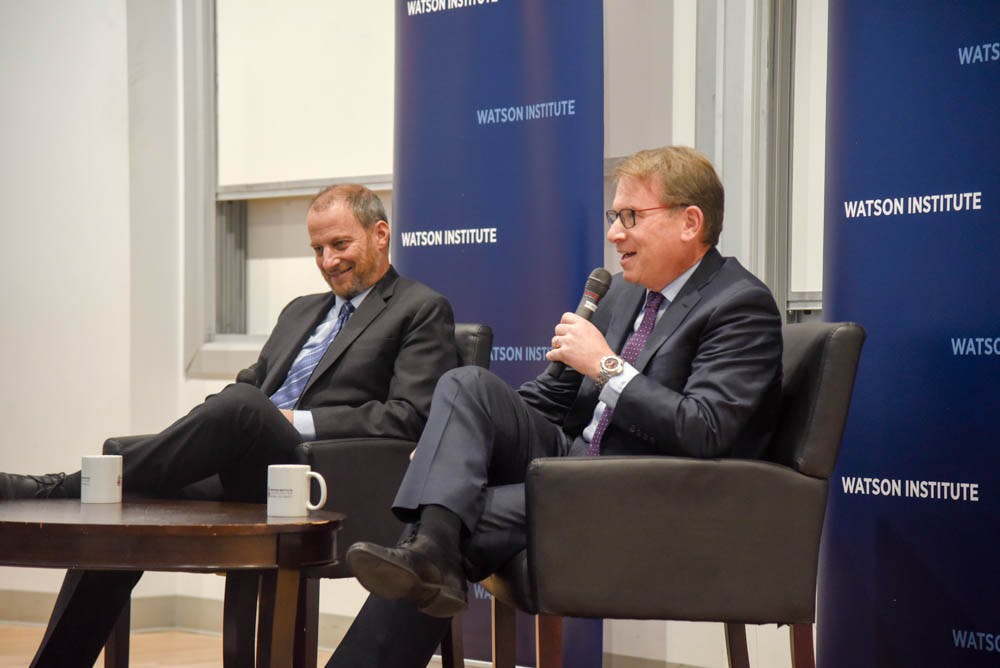In a crowded lecture hall, George Packer, a writer for the Atlantic and an award-winning author, described President Trump’s foreign policy as “a zero sum game, with us (the United States) against the rest.”
Joined by Jeffrey Goldberg, the editor-in-chief for the Atlantic, Packer went on to argue that Trump creates his foreign policy with a desire for the U.S. to remain powerful enough to intimidate other countries into submission if needed. Goldberg concurred, describing “Trumpism” as a reversal of the long-held American belief in the values of “muscular interventionism” and “diplomatic indispensability.”
These beliefs characterized the last 70 years of American foreign policy — a period that Goldberg and Packer said is embodied by the late Richard Holbrooke ’62, a former American diplomat and an assistant Secretary of State. Holbrooke serves as the subject of Packer’s most recent book — Our Man: Richard Holbrooke and the End of the American Century.
The two men continued to discuss the United States’ foreign policy efforts under the Trump administration, taking particular care to contrast the policies with Holbrooke’s diplomatic work. Beginning in Vietnam, Holbrooke always saw the United States as “the good guys,” Packer said. Though he eventually acknowledged that the conflict was ill-conceived, Holbrooke “was different from most politicians in that Vietnam did not fundamentally change him,” Packer said.
Holbrooke continued to advocate for U.S. intervention and stressed a “strategic and moral imperative” on the part of Americans to act whenever possible, Packer said. He took this impulse into Bosnia during the Serbian occupancy. “He negotiated the end of that war. It was a very flawed peace, but a peace that was needed,” he added.
But despite Holbrooke’s success in Bosnia, the two men argued that Holbrooke’s approach to the conflict in Afghanistan helped legitimize the sentiments that fueled Trump’s political rise. “The Holbrooke magic that worked in Bosnia did not work in Afghanistan,” Goldberg said. During his final days, Holbrooke worked to convince the Obama administration to give him permission to negotiate with the Taliban. But at that point, Holbrooke had established a reputation for being combative after receiving the enmity of former Afghan president, Hamid Karzai.
“This is where the tale turns tragic,” Packer said. Holbrooke “wanted money and (he) made a lot” from his diplomatic work. “It was a sort of legal corruption that implicated the political class in Washington,” Packer said.
And so Holbrooke became “the kind of figure that is partially responsible for the fact that Americans no longer trust our leaders to use their money and blood wisely, enabling the Trump era,” he added.
Holbrooke did not live to see Trump’s presidency, but Packer and Goldberg believe that he would have felt horrified. “We are in an unprecedented situation,” Goldberg said. “What’s interesting to me is not the emperor, but all the people around the emperor who are insisting that he’s wearing clothes. … The structure of the (Republican) party and the very intelligent people within that party who are insisting that ‘This is normal.’ That’s the issue.”
Citing the ongoing impeachment proceedings in Washington, Goldberg added that Trump’s presidency could end “tomorrow if a handful of Republican leaders say, ‘Thank you for your service, but we’re moving on now.’”
Yet, Goldberg and Packer expressed an awareness that Trump could still retain support despite the controversies surrounding his conduct as President. “We can normalize anything, that’s the human gift,” Goldberg said.
“It’s a lot more fragile than we thought. … Once you take a taboo away you can’t really restore it,” Packer said. “It feels like a plague is hitting all of us because we’re all too close to it to not be infected.”
Philip Weinstein, who attended the event, expressed similar worries. Trump’s approach to foreign policy is “mystifying to me,” Weinstein told The Herald. “It’s very depressing, even more so than I thought. (Trump) doesn’t know what he’s doing. He’s what I call ‘a bull in a china shop.’”
Benjamin Weber MA’08,who will teach a spring 2020 course on U.S. foreign policy and the carceral state, said it was “interesting to learn how foreign policy comes home and how different aspects of foreign policy have influenced the carceral state domestically.”
Ultimately, Goldberg views the situation as a call to action for young people. “It’s a great time for undergraduates to get involved in foreign service,” he said. “There’s the saving grace of this particular moment: the American people are getting to see people we’ve never even heard of take their roles seriously and understanding how to better American democracy.”
Packer agreed, telling the audience that “It’s up to us. … If Trump is a one-term president, the damage done could potentially be repaired. If he continues for a second term, it’s irreversible.”





